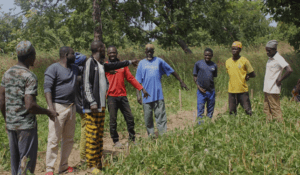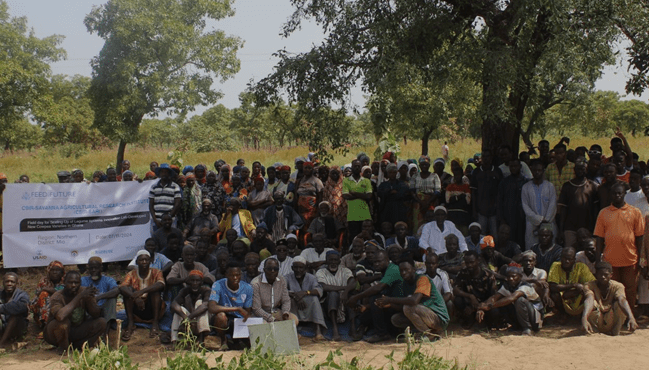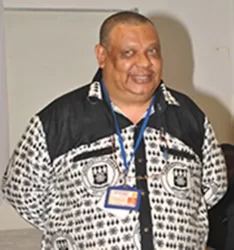By Samuel SAM
The Council for Scientific and Industrial Research – Savanna Agricultural Research Institute (CSIR-SARI) has unveiled two high-yielding cowpea varieties—Awudu Benga and Kanton Bongdaa—to smallholder farmers in the Mion District of Northern Ghana. This initiative aims to enhance cowpea production, food security and revenue generation for farmers.

The varieties, capable of yielding an average of 1.4 tonnes per hectare, are rich in essential nutrients such as iron, calcium and zinc, and contribute to soil health. These qualities are expected to transform the livelihoods of farmers, create employment opportunities for youth and promote sustainable agriculture.
The announcement was made during a field day held at Sanzee in the Mion District, one of the United States Agency for International Development (USAID) Zone of Influence districts. The event, attended by 254 smallholder farmers and stakeholders, showcased the potential of the new varieties to address challenges in cowpea cultivation while training farmers in effective production practices.

Features of the new varieties
Dr. Emmanuel Owusu, a cowpea breeder at CSIR-SARI, highlighted the advantages of the new varieties.
“These cowpeas can achieve grain yields of 2.52 and 2.62 tonnes per hectare. They are drought-tolerant, pest- and disease-resistant, and mature early – within 65 to 70 days,” he explained. “Their high nutritional value and ease of harvesting—due to pods positioned above the canopy—make them ideal for both manual and mechanical harvesting.”
Dr. Owusu emphasised the importance of adopting these varieties alongside best agronomic practices to maximise yields and combat the effects of climate change.
Practical training for farmers
Farmers were trained on good agronomic practices by research scientist Mr. Frederick Awuku. Topics covered included seed selection, land preparation, planting techniques, pest management, efficient resource use, and post-harvest handling.
“The training has equipped farmers with actionable strategies to optimise crop health and productivity,” said Mr. Awuku.
Agriculture Extension Agent for the Sanzee community, Mr. Abukari Kudus, urged farmers to embrace the new varieties and recommended practices. “With these innovations, your yields and incomes can significantly improve,” he assured them.
One of the lead farmers, Mr. Adam Napari, expressed optimism. “I learned so much about planting and caring for these new cowpeas. I feel confident that my yields will improve, which will boost my income and provide nutritious food for my family,” he said.
The project, funded by the Legume Systems Innovation Lab and USAID, is part of a broader effort to scale up new cowpea varieties in Ghana. Dr. Francis Kusi, the project’s principal investigator, described the field day as an invaluable opportunity for farmers to directly engage with the new varieties.
“Our goal is to empower farmers with knowledge and access to seeds that can transform their harvests and livelihoods,” Dr. Kusi noted.
Through community-focused events like this, CSIR-SARI continues to deliver impactful agricultural innovations to those who need them most, fostering resilience and prosperity among smallholder farmers in Northern Ghana.










